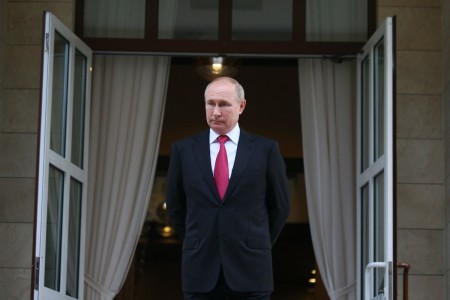Russia adds ‘LGBT movement’ to list of terrorist organizations after Supreme Court ruling

Russia has designated the "LGBT movement" on its list of extremist and terror organizations, aligning with a Supreme Court decision last year.
State media reported that the "LGBT movement" was added to the list maintained by the Rosfinmonitoring agency, which works to combat terror financing and has the power to freeze the bank accounts of over 14,000 entities and individuals designated as extremists.
The designation applies to the "international LGBT social movement and its structural units," according to state news agency RIA. The Rosfinmonitoring list currently contains 511 organizations.
Russian media also notes that the Russian Ministry of Justice included the "LGBT movement" on a list of banned and liquidated organizations in March.
The move has sparked international condemnation and concerns over human rights violations.
In November, Russia's Supreme Court ruled LGBT activists as extremists based on a motion filed by the Russian Justice Ministry to ban the movement's "activity on the territory of the Russian Federation."
According to the human rights group Amnesty International, a person convicted of involvement in LGBT-affiliated "extremist organizations" could face between five to 10 years in prison.
"This phrase, used by the Russian Ministry of Justice, appears to target not an established, clearly defined group or initiative, but any activism in defense of the human rights of LGBTI people or even any public association with the LGBTI community," Amnesty International reported.
At the time, a spokesman for the Russian Orthodox Church, which has faced international scrutiny for its leaders' support of the invasion in Ukraine, called the ruling a "form of moral self-defense by society" against attacks on "the Christian idea of marriage and family from the public and legal realms."
This ruling followed a broader trend of tightening restrictions on LGBT expressions in Russia, emphasizing traditional family values. Laws have been enacted against promoting "non-traditional" sexual relations and gender changes, reflecting the government's stance against Western liberal attitudes.
In 2022, Russia expanded laws to allow against "LGBT propaganda," with critics saying it gives authorities the ability to fine any person or group that promotes homosexuality.
The European Union criticized the Supreme Court ruling.
"Amid the decades-long crackdown on rights of LGBTIQ persons unleashed under President Putin, this decision aims at further persecuting the LGBTIQ community in Russia and aims to stifle civil society and those courageously defending human rights," the EU said in a statement at the time. "This decision will prevent LGBTIQ persons from enjoying their human rights and dignity over fears of unjustified persecution."
Last year, the Russian Orthodox Church severed ties with Western churches supportive of LGBT rights.
Putin's rhetoric has increasingly targeted Western liberal values, accusing them of undermining traditional family structures and promoting harmful ideologies.
Last February, Putin appeared to suggest the advancement of same-sex marriage and other rights for LGBT-identified people destroys the institution of the family and promotes pedophilia.
"Look at what they're doing with their own people," he said. "It is all about the destruction of the family, of cultural and national identity, perversion and abuse of children, including pedophilia, all of which are declared normal in their life."
As an illustration, Putin claimed priests were being forced to "bless same-sex marriages." Although Putin was likely referencing the Church of England's plans to bless same-sex marriages, the policy grants priests autonomy not to bless same-sex marriages.
"Look at the holy Scripture and the main books of other world religions," Putin said at the time. "They say it all, including that family is the union of a man and a woman, but these sacred texts are now being questioned."





















